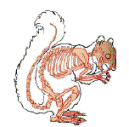
Edie Falco and James Gandolfini in The Sopranos (dir. David Chase et al., 1999-2007).
I've now seen all eighty-six episodes of The Sopranos. I found the final stretch of the sixth season emotionally exhausting--not because of the suspense as to who would bite it and when, which was frankly by this time rather irrelevant, as the series had so effectively hammered home its point that life is pointless, especially for ruthless Machiavels who long ago sold away any soul they might have had, but because of its hyper-realistic grasp of the American and global now. If the show can be said to have a politics, it is a politics of horror too intense ever to curdle into mere apathy, but too impotent ever to admit the possibility of spurring anyone to transform their sensibility. Blind catastrophe is a given. At some point one has to wonder, not only "how is this entertainment?" but "what in the way of contemporary drama could possibly be entertaining ever anymore?"
That anything at all besides cynicism and nausea can come out of this blighted vision is a tribute to the cast and crew, whose determination to make their fictional world one we can care about despite its clear hopelessness is all the more powerful for being at odds with the message contained in each frame: everything is so totally beyond fucked.



3 comments:
Even though I think The Sopranos is over-rated, I can't think of any other show that is better at freeze-framing the current, schismatic nature of our society. This even applies to the concept of the show: is it a domestic family-drama, or is it a show about mobsters? Almost everything about the show is indicative of how bi-polar we are or can be in the U.S.
How's it going, Kasey?
I need to watch more of this show. We have never had cable, so I haven't seen it. I watched the first episode on DVD, and I have to admit I wasn't impressed. Obviously, the show got better.
I'd say that one 'entertaining' feature is that amidst all the total-fucked-ness, the show can be very funny. Such as what Paulie says in the lost in the woods episode: "he was an interior decorater, he killed 16 czeckoslavakians." Which maybe highlights the constant push-pull of the entire series: Obviously maintaining an organized crime family takes some work if not some intelligence of some kind, but then there are these moments where Tony, Paullie or Christopher et al. show just glaringly ignorant if not outright dumb they can be. And I guess that we actually sympathize at various points with these people is just part of it's insidious charm.
Post a Comment